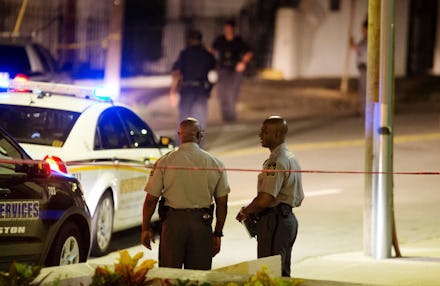There's One Word the Media Isn't Using When Talking About the Charleston Shooter

Terrorism. Few other terms accurately capture what happened.
Around 9 p.m. Wednesday, a white gunman opened fire during a Bible study session at the historically black Emanuel African Methodist Episcopal Church in Charleston, South Carolina. The New York Times reports that eight victims were killed at the scene, while a ninth died later at a nearby hospital. The gunman, identified as 21-year-old Dylann Storm Roof, was apprehended Thursday morning.
According to WSOCTV, one of the three people who survived the attack was a 5-year-old girl who played dead to avoid being shot. CNN reports Roof told another survivor that he "was letting her live so she could tell people what happened."
One term officials have used liberally to describe this incident is a "hate crime" — though Fox News' Steve Doocy, predictably, takes issue with it being characterized as racial, suggesting this was an attack on "Christians" rather than black people.
But the killer's alleged statements to one survivor — "You rape our women and are taking over our country and you have to go," he said, according to NBC 5's Eric King — seems to imply a targeted appeal to historical white fears of black encroachment, while the long history of white supremacists attacking black churches in the U.S. firmly situates this in a legacy of racial terror.
Yet still, we hesitate to use the word "terrorism." In modern Western parlance, that term is used overwhelmingly to describe acts of violence committed by Muslims. It was used when the media reported on the Charlie Hebdo massacre in Paris and the Muhammad cartoon shooting in Garland, Texas, last month. But when a 21-year-old white man opens fire on a room full of black churchgoers, terrorism charges are not levied so readily by the public or the media.
Perhaps the word needs to be reclaimed. Because make no mistake: The violence that's been committed against black people in the U.S. including and since slavery is one long, politically motivated act of terror. Mass violence, shootings, bombings and lynchings have been used to deny black people their rights to vote, move freely, attend schools, conduct business and generally exist in this country for centuries. And as long-standing centers for black spiritual and political life, black places of worship have been frequent targets.
So when an incident like the Charleston shooting occurs — in a church co-founded by slave revolt leader Denmark Vesey, no less — the hallmarks and trauma of American terrorism become not only apparent, but largely undeniable. Terrorism is terrorism, regardless of the perpetrator.
And if what happened in Charleston last night doesn't fit the bill, it's unclear what does.
June 18, 2015, 11:28 a.m.: This story has been updated.